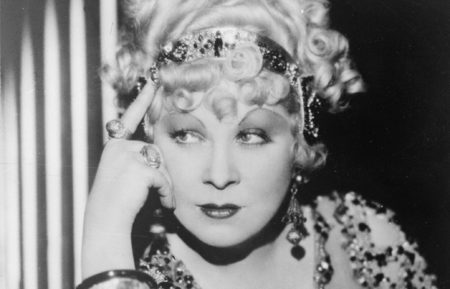Mae West

Actress • Singer • Writer
Birth Date: August 17, 1893
Death Date: November 22, 1980
Birth Place: Brooklyn, New York
When she was good, she was very good. But when she was bad, she made film history. Whether making films, writing plays, or flirting with the camera, Mae West was undisputedly the most controversial sex siren of her time.
At 33 years old, she wrote, produced, directed, and starred in her first Broadway play entitled "Sex," a 1926 production deemed so obscene that she landed in jail for it. She was the queen of double entendres on and off screen, delivering some of the best-remembered quips in movie history. In "She Done Him Wrong" (1933), West delivered one of the most quoted lines in movie history, "Is that a gun in your pocket, or are you just happy to see me?"
Mary Jane West was born on Aug. 17, 1893 in Woodhaven, NY. Her father, John Patrick West, was a boxer who later became a cop; her mother, Matilda "Tillie" Delker-D lger, was a former corset and fashion model. She had two siblings, Mildred Katherine "Beverly" West, and John Edwin West. The family moved quite often to various parts of Williamsburg and Greenpoint in Brooklyn, where she attended high school. The acting bug bit the New York native at an early age. At age five, she took home prizes for appearing in amateur shows. At age 12, she became a professional vaudeville performer.
West, who was less than 5'2 tall, was rumored to have worn customized 8-inch platforms attached to her sh s to increase her stage presence. The 1911 revue "A La Broadway" was her first legitimate Broadway show; which she left after only a week's worth of performances. In 1913, the young, raven-haired girl performed a salacious "shimmy" dance for a song-sheet; the song was "Everybody Shimmies Now." Her mother was said to have approved of all of her daughter's performances, making her perhaps one of the first of the notorious stage mothers.
Even at such a young age, West wrote several plays under the pen name "Jane Mast" and was arrested for "Sex" on Broadway, receiving a 10-day jail sentence. Rumors ran rampant that while behind bars, she was permitted to wear silk underpants instead of the rough prison garb everyone else had to wear and that the warden wined and dined her every night. She was set free after serving eight days. Nonplussed, she appeared in a string of successful plays, including "The Drag," a 1927 play that was banned from Broadway because of its homosexual theme. She was an advocate of gay and transgender rights, but her belief that "a gay man was actually a female soul housed in a male body" ran counter to the belief at that time that homosexuality was an illness. Nevertheless, she was still considered a feminist and a hardcore supporter of the gay community.
West continued to stir up controversy with her plays, including the Broadway smash "Diamond Lil" (1928), about a loose woman of the 1890s. She dominated the Broadway scene for many years to come, but she also set her eyes on another stage: Hollywood.
In 1932, Paramount Pictures courageously signed up the Broadway star. It was quite a feat at the time, for she was already considered a "mature" actress, but West looked younger than her 38 years. This youthful glow endured throughout the rest of her life and gave Hollywood's newest unlikely sex symbol an edge over her contemporaries. Her first film was "Night after Night" (1932), where she hated her small part in the film yet, true to form, she was allowed to rewrite her scenes. West stole the show during her first scene when the hatcheck girl complimented her baubles with "Goodness, what lovely diamonds." Without missing a beat, she exclaimed, "Goodness had nothing to do with it, dearie."
West's gaining popularity boosted her co-stars' careers as well. In "She Done Him Wrong," she insisted that a young Cary Grant play opposite her. The movie not only put Grant on the map, but it was also a box office hit and it received an Academy Award nomination for Best Picture. She co-starred with Grant again in "I'm No Angel" (1933), also nominated for a Best Picture award. Both movies were box office successes, as was West, who, at that time, became the second highest paid actor in the country. It was the former film which contained, perhaps, the most misquoted line in film history delivered by West to Grant: "Why don't you come up some time and see me?" versus the incorrectly but famously quoted West line, "Why don't you come up and seem me sometime?"
Despite her box office pull, her blunt sexuality onscreen kept rubbing the censors the wrong way. In 1934, censors - in care of the infamous Hayes Code of onscreen ethics - began deleting overtly sexy lines and scenes from her films. To fight back, West increased the number of double entendres, hoping that the censors would delete the most offensive lines and miss the subtler ones. More controversial films followed, including the critically acclaimed "Klondike Annie" (1936) and one of her biggest hits "My Little Chickadee" (1940) from Universal Pictures, as well as Columbia Pictures' "The Heat's On" (1943). West was already 50 when she made "The Heat's On," but her youthful look and performance made the film a cult favorite.
West continued to shock her fans and critics on radio, making two appearances on Edgar Bergen's very popular show. In one sketch, she starred opposite Don Ameche as Adam and Eve; the dialogue between the two was so risqué that she was banned from being featured, or even talked about on NBC. The line that caused all the fury was directed at Ameche, "Get me a big one I feel like doing a big apple!" Aside from radio, she appeared on TV a few times and even recorded two successful rock albums, post her film heyday of the 1930s.
After a 26 year absence from film, she once again stole the limelight - from that era's sex symbol, Raquel Welch, no less - in her comeback role as Leticia Van Alen in "Myra Breckinridge" (1970). The movie tanked at the box office, but it brought the actress back to the forefront once again and garnered her a new generation of fans - many of whom were gay. She married once, to fellow vaudevillian Frank Wallace, in 1911. She denied the marriage at first, but legal records proved otherwise. The divorce papers were granted on May 7, 1943. But West was not without male companionship, even in her later years when she surrounded herself with young muscular men, employing them as bodyguards and chauffeurs.
Despite the decades, her looks continued to make headlines. In the 1970s, she was the only celebrity who permitted reporters to check her for signs of plastic surgery. None were found. At age 85, West graced the silver screen for the last time as Marlo Manners in "Sextette" (1978), leading many doctors to exclaim, "She has the health and body of a 35-year-old." West once said that she spent hours every day massaging cold cream into her breasts to keep them looking young. The actress lived in Los Angeles for the remainder of her life, maintaining a residence on Ravenswood near Melrose Avenue. She was always gracious to her fans, corresponding with them personally and listing her phone number in Los Angeles so they could "call her and see her sometime!" In the summer of 1980, West suffered a concussion and a stroke. Later that year, she had another stroke and never recovered from it. She died at her apartment in Hollywood at age 87 on Nov. 22, 1980. Her fans' cries reverberated throughout the city. She was buried in Cypress Hills Cemetery in Brooklyn, and her star on the Hollywood Walk of Fame was placed at 1560 Vine Street in Hollywood.
Credits

Sextette

Sextette

Myra Breckinridge

The Heats On

My Little Chickadee

My Little Chickadee

Every Day's a Holiday

Every Day's a Holiday

Klondike Annie

Klondike Annie

Go West, Young Man

Go West, Young Man

Goin' to Town

Goin' to Town

Belle of the Nineties

Belle of the Nineties

I'm No Angel

I'm No Angel

She Done Him WrongStream

She Done Him WrongStream

































































































































































